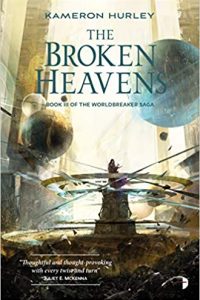Paul Di Filippo reviews Jill Ciment
I have missed the pleasures of reading Jill Ciment’s four previous novels, but the fact that her newest book ventures into genre territory gives me a workaday excuse to sample her writing. And I’ll cover it here even if the dustjacket copy calls Act of God “noir” rather than the piece of satirical fantastika it is. Oh, well, some old shibboleths die hard.
Ciment’s book is a compact, droll farce, light-hearted and pleasurable as a chocolate truffle, yet with a nugget of hard, somewhat unpalatable truths in the center. It is propelled into motion by a conceit that echoes, in what I am sure is a deliberate way, Jack Finney’s classic The Body Snatchers. Comparisons to the work of Kit Reed and Carol Emshwiller, Donald Westlake and J. P. Donleavy and Robert Sheckley are also easy to fashion. But ultimately, Ciment towers forth with her own brilliant voice.
Let us zoom in from on high, like God Himself, on a brownstone in Brooklyn in the immediacy of now. There are two households therein. Vida Cebu is the owner of the whole building. A middle-aged actress of some small repute—Vida was the famous commercial face of Ziberax, the first female-orgasm-enhancement drug—she has retrofitted most of the building for her own dwelling. But she has been unable to dislodge the twin sisters in their sixties who have an unbreakable lease. Kat and Edith could not be more dissimilar. Edith is the ant of the pair, having spent all her old-maid life as a law office librarian. Kat has been the grasshopper, enjoying a hedonistic life as a Deadhead and assorted other impractical, way-out avocations. Down on her luck, Kat has been forced to move in with the smug and somewhat censorious Edith. But Kat hopes to be back on her feet soon, thanks to compiling a book containing the best of the self-help columns penned by their mother, and culled from the immense archives stored in the apartment.
Meanwhile, Vida is stricken with a peculiarly urban horror: a stranger is discovered to be inhabiting the interstices of her apartment. (Ciment surely based this incident on numerous real-life occurrences, such as a famous one from Japan.) Ashley, a young Russian woman in the USA on a work visa, who has become homeless, not only raids Vida’s food, but also her lingerie drawer. Ick! Unrepentant yet self-loathing, expelled from Vida’s home, Ashley will soon resurface.
But the main trouble at the brownstone—and, eventually, the whole block, then the whole city—is the infestation by glowing, suppurating phallic fungi, contact with which is ill-advised for humans. As Frank, the lowbrow super of the building says to Vida, “You should make a movie of your life and call it Andromeda Strain II.”
Ciment never loses the intimate focus on her mostly female cast, while still giving us the big picture of catastrophe through the employment of perfectly selected vignettes: Vida entering a decontamination tent in her underwear, for instance, or life for Kat and Frank at the refugee center. Her interweaving plotlines are so nimbly handled that every development seems simultaneously unpredictable, yet organically predetermined. The story might sometimes appear to be a massive clockwork, but it has the astonishing intricacy of the finest Old World municipal tower clock, where astonishing figures pirouette in and out of every niche. Ultimately, it’s all about kismet and karma, as the themes of responsibility, guilt, innocence, ambition and secrecy receive a stirring workout via beautifully realized “objective correlatives.”
This blackly funny book contains absolutely no cant or pieties. There’s no feelgood, self-righteous hero/villain dichotomies, no blaming of society for individual screwups, no sitcom “lessons learned.” The most hapless characters come to the worst ends, and Vida, arguably the most culpable figure here, experiences not only her share of justifiable tragedy, but also what might paradoxically be the “happiest” ending.
Ciment has the bracing mindset of Ambrose Bierce or Mark Twain, George Alec Effinger or Tom Disch. The title, “act of god,” is invoked by the characters numerous times, and it’s the key to the whole book. The cosmos is unfair, blind and sometimes lethal. A giant ancient mushroom growing under Brooklyn can derange and destroy the lives of thousands, not because the mushroom is some evil alien invader, the fungal equivalent of a sociopath, but simply because it is an organism trying to live its own existence according to the dictates of its nature.
“As flies to wanton boys are we to the gods,” might be Ciment’s moral. Except that we do not even get the satisfaction of being the playthings of a nonexistent deity. It’s all just physics, biology and chance, and we take our comforts where we can, like poor Ashley hiding in someone’s car or closet.









